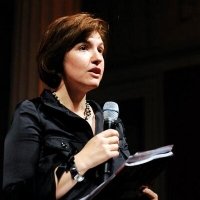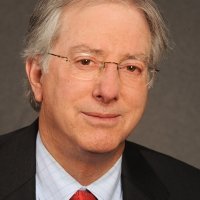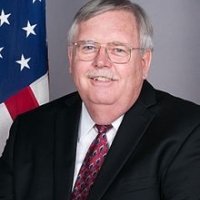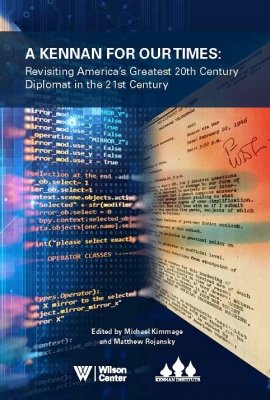A Kennan for Our Times: Celebrating the Legacy of George F. Kennan
[[{"fid":"106751","view_mode":"default","fields":{"field_file_image_alt_text[und][0][value]":"Wilson at 50 logo","field_file_image_title_text[und][0][value]":"","field_file_source[und][0][value]":"A Wilson @50 Event","field_file_caption[und][0][value]":""},"type":"media","attributes":{"alt":"Wilson at 50 logo","class":"media-element file-default"}}]]
Although George F. Kennan died in 2005 at over 100 years old, his legacy remains ubiquitous in many of the major foreign policy issues that we currently face, particularly regarding U.S.-Russian relations. Yet when a new era of crisis and confrontation broke out between the United States and the Russian Federation in 2014, Kennan’s life, career, and thinking assumed a fresh salience as policymakers began to reassess bilateral relations. “A Kennan for Our Times” is an international conference that will gather the contemporary thinking of policymakers and scholars on all things Kennan. Using his legacy and foreign policy outlook as a launching pad, this conference focused on U.S.-Russian relations, current challenges posed to policy formation, and will analyze the contemporary international scene.
During his illustrious career in the State Department, Kennan helped establish and direct the Office of Policy Planning, where he developed and articulated a comprehensive understanding of the Soviet Union. This became the foundation for a series of policy prescriptions that defined the early Cold War. Do Kennan’s core insights about the Soviet Union apply to Putin’s Russia? What bearing does containment have on U.S.-Russia strategy today? Do today’s Russia experts stand in the “Kennan tradition” or has the nature of expertise on Russia been altered beyond recognition from Kennan’s day? These are some of the questions that conference speakers assessed at the event.
This conference also traveled beyond the erstwhile Cold War superpowers, addressing concerns that are not confined to the U.S.-Soviet relationship. These concerns include China’s past and present role in the international arena, how global decolonization has impacted international affairs, the multifaceted impacts of globalization, and the related challenge of failed states and terrorism. It also assessed the new forms of diplomacy represented by efforts to enforce nuclear nonproliferation vis-a-vis North Korea and Iran, which invite rigorous comparison with Kennan’s proposals for containing the Soviet Union.
This event was made possible thanks to the generous support of the NADAV Foundation of Leonid Nevzlin.
AGENDA
9:00-10:30 Kennan and U.S.-Russia Relations
This panel will address Kennan’s major ideas about U.S.-Russian relations: the need for containment during the Cold War, the commitment to diplomatic dialogue and the skepticism Kennan aired about post-Cold War Western policy toward Russia. These ideas will help to reflect on important contemporary issues that the United States and Russia currently consider: the strategic and diplomatic challenge Russia poses to the U.S and its European allies and the ideal balance of confrontation and dialogue in light of these challenges.
Speakers:
- Andrey Kortunov, Director General, Russian International Affairs Council
- Ivan Kurilla, Professor and Director of Department Development Partnership Program, European University at St. Petersburg
- Angela Stent, Director for the Center for Eurasian, Russian, & East European Studies, Georgetown University School of Foreign Service
- Amb. John Tefft, Former U.S. Ambassador to Russia
Moderated by: Matthew Rojansky, Director, Kennan Institute
11:00-12:30 Policy-Planning after Kennan
This panel will invite personal reflection from its participants, each a former policy planning director. They will speak to the role Kennan’s writings played in their respective tenures as policy planning directors; his personal influence on them; to the relationship between the analysis of the Soviet Union or Russia and the development of American foreign policy; and to the areas of agreement and disagreement the individual participants have with Kennan and his long legacy.
Speakers:
- Jon Finer, Former Chief of Staff and Director of Policy Planning, Department of State
- Jake Sullivan, Former National Security Adviser to Vice President Joe Biden, Former Director of Policy Planning and Chief of Staff, Department of State
- Dennis Ross, Counselor, Washington Institute for Near East Policy
- Anne-Marie Slaughter, President and Chief Executive Officer, The New America Foundation
Moderated by: Michael Kimmage, Professor of History, Catholic University of America
2:00-3:30 Kennan and the Contemporary International Scene
This panel will broaden the focus beyond Russia, delving into Kennan’s sense of international order, his controversial elitism, his thinking about the world outside of Europe and his generally resistant attitude toward modern technology. By doing so it will critically examine Kennan’s salience for the present moment. Its goal will not be to come to a definite conclusion about Kennan but to sketch the outlines of contemporary international politics by comparing and contrasting the present with the past that Kennan represents and embodies.
Speakers:
- David Engerman, Ottilie Springer Professor of History, Brandeis University; as of Summer 2018, Professor of History, Yale University
- Susan Glasser, Chief International Affairs Columnist, POLITICO
- James Goldgeier, Professor of International Relations, American University School of International Service, Visiting Senior Fellow, Council on Foreign Relations
- Chris Miller, Assistant Professor of International History, Tufts University Fletcher School
- Grace Kennan Warnecke, Chairman of the Board, National Committee on American Foreign Policy
Moderated by: William Pomeranz, Deputy Director, Kennan Institute
Selected Quotes
Kennan and U.S.-Russia Relations
Matthew Rojansky
“Kennan, some might argue, defined the intellectual and political pole most distant from Wilsonianism. If Wilson, for instance, built an ideology on defending ideals, Kennan shrewdly dissected ideology from practice. Where Wilson cherished rules and anointed their guardians, Kennan looked to interests and admonished rule-makers not to deal in absolutes."
Andrey Kortunov
“When we talk about Russia today, counterintuitively, it is a 'status quo power' which sometimes reverts to spurious tactics to make its case... So when we are thinking about containment, we should make a qualification, because these days, it is not an extended, aggressive, revisionist, or revolutionary power which has to be contained by the United States. It’s a very different pattern of international behavior you have to deal with.”
“If we were successful with integrating Russia and if Russia had got its place at the table... probably the whole issue of NATO enlargement would not have become so sensitive and so divisive.”
Ivan Kurilla
“The political world makes decisions not just based on the knowledge of another country. The knowledge that experts can provide may resonate or not resonate with the other factors the political world uses in defining their policies toward other countries. George Kennan was very fortunate that his vision during the late 1940s resonated... Kennan’s ideas were just in time to define to the Washington community, the political community, the new role of the United States.”
“The big changes in the policy and the big changes of American policy toward Russia or the USSR — or Russian policy toward America — happens usually when the nation which changes [the policy] is in a crisis.”
Angela Stent
“Americans and Europeans didn’t foresee the degree to which Russia was able to deal, for instance, with the post-Crimea sanctions, and recover through a combination of astute financial management and rising oil prices. I think we underestimate at our peril Russia’s ability to pull through, to survive, and to continue making progress.”
“These two factors — essential antipathy toward the West and domestic authoritarian rule — led Kennan to conclude, ‘This means we are going to continue for a long time to find the Russians difficult to deal with.’ And 71 years later, I’m not sure that anyone would disagree with that.”
Amb. John Tefft
“I think most of my colleagues at [the Department of] State during these years understood clearly the role of Kennan and his articulation of the policy of containment. We were all, in many ways, his intellectual protégés, but we also understood how our policies had evolved since the time of the Long Telegram, in ways that Kennan disagreed with, to combat with military means the threat which the Soviet Union embodied."
“How would Kennan see Russian society today and the way it has changed? In many ways, Russia is still searching for its identity in the post-Soviet world. How would Kennan view resurgent Russian nationalism under Putin and the lack of Russian understanding of the national sentiments among the nations of the former Soviet Union? What would he think of the new generations of young Russians — not just those that are out in the street following Navalny and demonstrating — but many, many more?”
Policy-Planning after Kennan
Jon Finer
“I think, right now, given some of the tools that Congress has imposed on the [Trump] administration, particularly on the financial side, and some of the groundwork that [the Obama] administration laid in response [to] Ukraine… I actually think they have a lot of pressure they could bring to bear and there’s a complete dearth at this point of engagement towards any particular goal."
"You have an administration that has actually increased military involvement in just about every theater of conflict that they have inherited, but it is unmarried to sort of any discernable diplomatic approach that can help take advantage of that leverage and drive it towards particular ends. I say this with the humility of having served in an administration that did not always get that balance right, but I think we may now be erring to some extent on the other side.”
Jake Sullivan
“The single most important factor in strategy — which is setting priorities, knowing what the main thing is you are driving for — is probably the single hardest thing for American foreign policy to do in a modern era in which anything happens anywhere in the world and the United States’ natural reaction is ‘How do we go deal with that?’... and everyone else’s natural reaction is ‘What’s the United States going to do or say about that?’”
"I would say that over the past 20 to 25 years… in a way, the United States has had the luxury of not being as focused on the hardcore elements of strategy as many of our adversaries, including Vladimir Putin, who is operating more from a position of weakness than strength than the United States and therefore has to think a lot more about how to use leverage, tools, and resources to achieve [his] objective.”
Dennis Ross
“There is a constant struggle within policy planning to again define the role and strike the right kind of balance. What I mean by that is if the office is too involved with the day-to-day, then it loses the broader perspective, the policy guidelines it should be shaping, the strategic priorities that, in a sense, should reflect those policy guidelines. On the other hand, if it’s too general — if it’s operating at too high a level of principle, then it’s completely irrelevant to what’s going on in terms of day-to-day."
“I think what’s been missing in the relationship [between the Trump administration and Russia] so far is the application of American leverage. How much this is tied to the investigation [or] how much this is tied to this president obviously not having an inclination to be particularly blunt with Putin, but if there’s one thing that describes Putin, he takes a measure.”
Anne-Marie Slaughter
"If you look at his doctrine of containment, I would argue he was every bit as much focused on the people — that in the end, containment says, 'We just block them. If we can hold them to where they are, the Russian people will do the rest.' [In] the long term, he had an understanding that changes come from domestic politics.”
“I don’t think Kennan would have recognized the idea of elevating development; I don’t think he really thought of development in those terms. But I do think part of what made him great was that he did not just analyze the world in terms of state-to-state relations. He was a diplomat that had a profound knowledge of context and people.”
Kennan and the Contemporary International Scene
David Engerman
“Kennan learned, first of all, not to focus on ideologies, but on peoples and cultures... to understand political and social systems in historical contexts.”
“Kennan had a deep distrust of ideologies generally — of Soviet communism to be sure, but also of American liberalism.”
Susan Glasser
“As new challenges have accreted in the post-Cold War era, we have not necessarily come up with a new ideology to replace them... Whether it’s Iran, North Korea, China, [or] a resurgent Russia itself, we tend to apply, pretty indiscriminately, the notion, or what we think is the notion, of containment to this new set of 21st-century problems.”
“My guess is that Kennan himself would have hated that National Security Strategy and would have thought that we are in pretty big trouble in the world today.”
James Goldgeier
“[Kennan] was also a pessimist, which is quite an interesting feature of somebody who ended up forecasting the collapse of the Soviet Union.”
“At the State Department in 1994, they brought the 90-year-old George Kennan for a conversation to get his advice... ‘How do we come up with the one-word summation of American foreign policy that you did back in 1946-1947?’ And Kennan’s answer was, ‘The world is far too complex for that today and my advice would be to come up with a thoughtful paragraph or two.’”
Chris Miller
“The reality is that Kennan, the historian, discovered... that public opinion is always, whether you like it or not, a crucial factor in shaping the options that are valuable to decision-makers like him.”
“[Kennan] had a strain of elitist thinking, thinking, 'If only we had the type of government where the experts were always in control'... It’s easy to see why a citizen like Kennan or anyone else could fall into the trap of thinking that way, but what I would like to suggest is that idea is wrong. And the reason I know it’s wrong is because Kennan, the diplomatic historian, proved that it’s so, eloquently, so many times.”
Grace Kennan Warnecke
“My father was definitely an elitist, but in the better sense of the word; he felt very strongly about the importance of knowledge [and] he considered the more you know about a country, the more sensitive you can be towards it.”
“In terms of what is happening in the State Department today - staff cuts, resignation of senior officials, empty ambassadorial posts - he would be appalled.”
“His containment policy was also predicated on his gut feeling that the Soviet Union was in some way unnatural and therefore temporary... When asked why the Kennan Institute was named the 'Institute for Advanced Russian Studies,' he answered, 'because the Soviet Union will not last, but Russia will.”
Related Publication
Speakers






Professor, History and International Relations; Director, Department Development Partnership Program, Academic Director of the IMARES program, European University at St. Petersburg, Russia






Hosted By

Kennan Institute
The Kennan Institute is the premier US center for advanced research on Eurasia and the oldest and largest regional program at the Woodrow Wilson International Center for Scholars. The Kennan Institute is committed to improving American understanding of Russia, Ukraine, Central Asia, the South Caucasus, and the surrounding region through research and exchange. Read more

